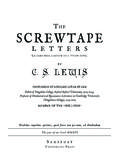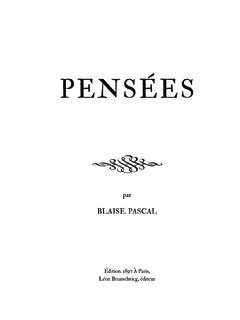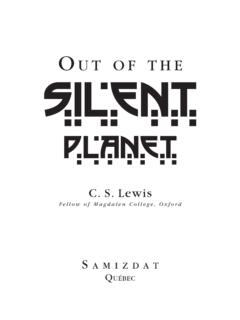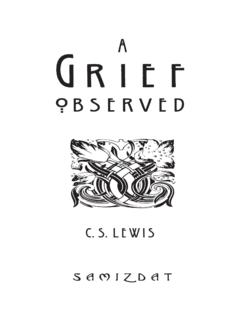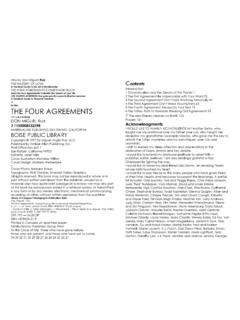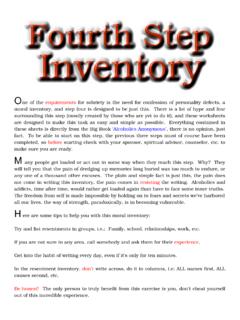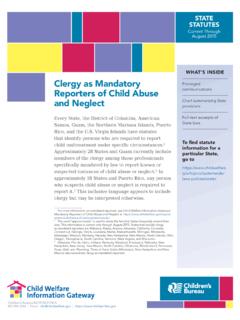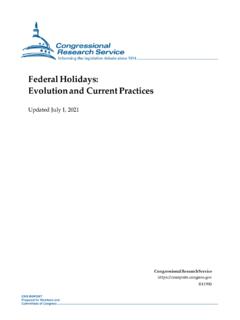Transcription of The Four Loves - samizdat
1 TheFour datThe four Loves by C. S. Lewis (1895-1963)Source : Date of first publication: 1960 Source: Project Gutenberg Canada, Ebook #1202 Ebook text was produced by Al Haines Edition used as base for this ebook: London: Geoffrey Bles, 1960 [first edition]This ebook was produced by Marcia Brooks, Mark Akrigg, Stephen Hutcheson & the Online Distributed Proofreading Canada TeamWarning : this document is for free distribution samizdat 2018 DisclaimerThis eBook is for the use of anyone anywhere at no cost. Copyright laws in your country also govern what you can do with this work. Copyright laws in most countries are in a constant state of flux.
2 If you are outside Canada, check the laws of your country before down-loading, copying, displaying, performing, distributing or creating derivative works based on this samizdat Ebook. samizdat makes no claims regarding the copyright status of any work in any country outside our affections kill us not, nor Chad WalshTABLE of contentsCHAPTER IIntroduction 1 CHAPTER IILikings and Loves for the Sub-human 7 CHAPTER III Affection 21 CHAPTER IVFriendship 37 CHAPTER VEros 59 CHAPTER VI Charity 751 CHAPTER IIntroduction God is love ," says St.
3 John. When I first tried to write this book I thought that his maxim would provide me with a very plain highroad through the whole subject. I thought I should be able to say that human Loves deserved to be called Loves at all just in so far as they resembled that love which is God. The first distinction I made was therefore between what I called Gift- love and Need- love . The typical example of Gift- love would be that love which moves a man to work and plan and save for the future well-being of his family which he will die without sharing or seeing; of the second, that which sends a lonely or frightened child to its mother's was no doubt which was more like love Himself.
4 Divine love is Gift- love . The Father gives all He is and has to the Son. The Son gives Himself back to the Father, and gives Himself to the world, and for the world to the Father, and thus gives the world (in Himself) back to the Father what, on the other hand, can be less like anything we believe of God's life than Need- love ? He lacks nothing, but our Need- love , as Plato saw, is "the son of Poverty". It is the accurate reflection in consciousness of our actual nature. We are born helpless. As soon as we are fully conscious we discover loneliness. We need others physi-cally, emotionally, intellectually; we need them if we are to know anything, even was looking forward to writing some fairly easy panegyrics on the first sort of love and disparagements of the second.
5 And much of what I was going to say still seems to me to be true. I still think that if all we mean by our love is a craving to be loved, we are in a very C. S. Lewis2deplorable state. But I would not now say (with my master, MacDonald) that if we mean only this craving we are mistaking for love something that is not love at all. I cannot now deny the name love to Need- love . Every time I have tried to think the thing out along those lines I have ended in puzzles and contradictions. The reality is more complicated than I of all, we do violence to most languages, including our own, if we do not call Need- love " love ".
6 Of course language is not an infallible guide, but it contains, with all its defects, a good deal of stored insight and experience. If you begin by flouting it, it has a way of avenging itself later on. We had better not follow Humpty Dumpty in making words mean whatever we , we must be cautious about calling Need- love "mere self-ishness". Mere is always a dangerous word. No doubt Need- love , like all our impulses, can be selfishly indulged. A tyrannous and glut-tonous demand for affection can be a horrible thing. But in ordinary life no one calls a child selfish because it turns for comfort to its mother; nor an adult who turns to his fellow "for company".
7 Those, whether children or adults, who do so least are not usually the most selfless. Where Need- love is felt there may be reasons for denying or totally mortifying it; but not to feel it is in general the mark of the cold egoist. Since we do in reality need one another ("it is not good for man to be alone"), then the failure of this need to appear as Need- love in consciousness in other words, the illusory feeling that it is good for us to be alone is a bad spiritual symptom; just as lack of appetite is a bad medical symptom because men do really need thirdly, we come to something far more important. Every Christian would agree that a man's spiritual health is exactly propor-tional to his love for God.
8 But man's love for God, from the very nature of the case, must always be very largely, and must often be entirely, a Need- love . This is obvious when we implore forgiveness for our sins or support in our tribulations. But in the long run it is perhaps even more apparent in our growing for it ought to be growing awareness that our whole being by its very nature is one vast need; incomplete, preparatory, empty yet cluttered, crying out for Him who can untie things that are now knotted together and tie up things that are still dangling loose. I do not say that man can never bring to God anything at all but sheer Need- love .
9 Exalted souls may tell us of a reach beyond that. But they would also, I think, be the first to tell us that those heights would cease to be true Graces, would become Neo-Platonic or finally diabolical illusions, the moment a man dared to think that he could live on them and henceforth drop out the 3 The four Loveselement of need. "The highest," says the Imitation, "does not stand without the lowest." It would be a bold and silly creature that came before its Creator with the boast "I'm no beggar. I love you disinterest-edly". Those who come nearest to a Gift- love for God will next moment, even at the very same moment, be beating their breasts with the publican and laying their indigence before the only real Giver.
10 And God will have it so. He addresses our Need- love : "Come unto me all ye that travail and are heavy-laden," or, in the Old Testament, "Open your mouth wide and I will fill it."Thus one Need- love , the greatest of all, either coincides with or at least makes a main ingredient in man's highest, healthiest, and most realistic spiritual condition. A very strange corollary follows. Man approaches God most nearly when he is in one sense least like God. For what can be more unlike than fullness and need, sovereignty and humility, righteousness and penitence, limitless power and a cry for help? This paradox staggered me when I first ran into it; it also wrecked all my previous attempts to write about love .
